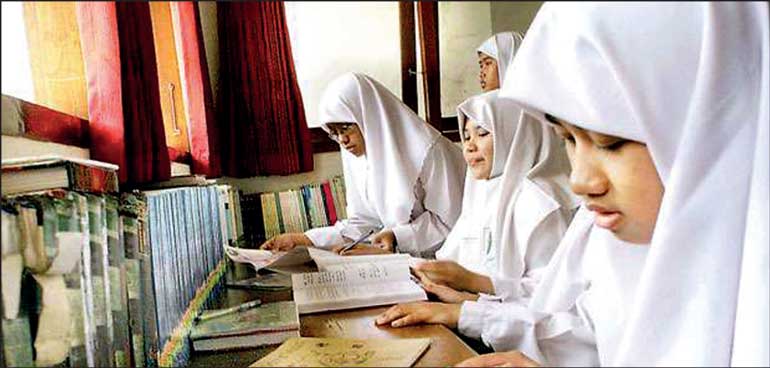Monday Feb 23, 2026
Monday Feb 23, 2026
Saturday, 13 July 2024 00:03 - - {{hitsCtrl.values.hits}}

The Human Rights Commission of Sri Lanka (HRCSL) has launched a suo motu inquiry into allegations of the infringement of religious freedom and the right to education in Trincomalee, concerning the withholding of Advanced Level examination results for approximately 70 students from Zahira College.
During a discussion held on 8 July at the HRCSL Head Office with officials from the Department of Examinations and the University Grants Commission, the HRCSL addressed the incident where the students’ results were withheld due to alleged violations of examination rules. These rules reportedly mandated that candidates’ ears be visible during the examination to prevent the use of electronic devices.
The HRCSL highlighted that, according to Article 10 of the Sri Lankan Constitution, all individuals are entitled to freedom of thought, conscience, and religion. Article 12(2) prohibits discrimination based on sex or religion, while Article 14(1)(e) guarantees the freedom to manifest one’s religion or beliefs publicly. The HRCSL underscored that religious attire, including head coverings worn by Muslim women, is protected under these provisions.
The Commission expressed concern that the examination rule requiring visible ears could discriminate against Muslim girls who wear head coverings. It noted that any restriction on such attire must be legally justified and necessary for a specific purpose as outlined in Article 15(7) of the Constitution. Discriminating against citizens based on religious attire could violate their right to non-discrimination.
Moreover, the HRCSL cited Article 27(2)(h) of the Constitution, which recognises the right to universal and equal access to education. Withholding examination results could contravene this right. Additionally, section 5(2) of the International Covenant on Civil and Political Rights (ICCPR) Act, No. 56 of 2007, mandates that administrative authorities prioritise the best interests of the child in matters affecting children.
During the discussion, both the Department of Examinations and the University Grants Commission reported that the results for the affected students had been released. They also indicated that remedial measures were being taken to allow these students to apply for re-scrutiny of their examination scripts and for university entrance. The HRCSL emphasised that no student should be disadvantaged by the delay in releasing their results.
The HRCSL urged the Department of Examinations to review the interpretation of the examination rule. According to statements recorded by the HRCSL Regional Office in Trincomalee, the affected candidates – all Muslim girls – wore loose transparent head coverings that did not obstruct the visibility of their ears. The HRCSL advised a thorough assessment to determine if the attire violated any examination rules.
Furthermore, the HRCSL noted that no other school in Sri Lanka had experienced a similar issue, suggesting a selective application of the rule targeting Zahira College candidates. The HRCSL also pointed out that only one female invigilator had been assigned to the examination hall, which impacted the rights and freedoms of the candidates. It recommended that the Department of Examinations ensure an adequate number of female invigilators in future examinations.
The Department of Examinations committed to reviewing the rule’s interpretation to ensure consistency and avoid future incidents. The HRCSL said it will continue to monitor the implementation of remedial measures and engage in a consultative process to formulate General Guidelines and Recommendations on the Freedom of Religion or Belief for dissemination among state authorities.